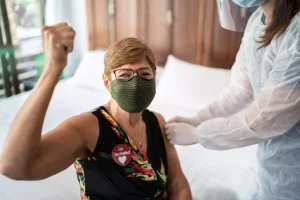Author: Sofia Quaglia | Original article appeared in VeryWellHealth
Key Takeaways
- Researchers surveyed over 8,000 adults in the United States about their mental health during the pandemic, starting before vaccines were available.
- People who got vaccinated reported reduced anxiety and depression compared to people who did not get vaccinated.
- Experts say getting vaccinated offers a sense of control over a traumatic experience.
The COVID-19 vaccine may help protect against more than just illness. New research shows that people who received their COVID-19 vaccine also experienced better mental health after just one dose.
This research by the Center for Economic and Social Research (CESR) at the University of Southern California Dornsife College, published recently in the journal PLOS One, helps scientists better understand the relationship between physical health and mental health.
Researchers are hopeful these findings can help public health experts better handle pandemic-like emergencies in the future.
Get Vaccinated to Improve Your Mental Health
Researchers surveyed approximately 8,000 American adults between March 2020 and March 2021, collecting more than 157,000 observations about their moods and behaviors.
The surveys’ aim was to track participants’ mental health before and after they got their shots, cross-referencing it with questions about their depression and anxiety from standardized psychoanalysis tests.
As expected, vaccinated people were significantly more likely to experience a reduction in mental distress after getting vaccinated. The study found a 15% reduction in severe depression and a 4% decrease in mild depression among participants who received the shot.
“I certainly felt a weight off from shoulders when my wife and I got the vaccine,” Perez-Arce says. “We felt much less stress. And the feeling was shared among friends and family. At the time when many of us were getting vaccinated, there was an air of relief.”
Because of the nature of the research—which only looked into everybody’s personal mental health after their own personal vaccination—the ripple effect of the vaccine rollout on mental health overall might actually be even bigger.
“Our results only capture the reduction in mental distress after receiving a shot for oneself, and not the overall effect of the vaccination campaign, which likely was even stronger,” Perez-Arce says.
What This Means For You
If you’re eligible to get vaccinated but haven’t done so, you can find an appointment near you here.
Vaccination Provides a Sense of Control
The study, however, does not give a complete picture of mental health during the pandemic.
Data collection for this study stopped in March of 2021. At the time, the general public wasn’t yet eligible to get vaccinated.
“The study is therefore skewed a bit in looking at an older population,” Cecily Havert, MD, a physician at Northern Virginia Family Care Practice, tells Verywell. “It would be interesting to collect data on the younger cohort, whose mental health was negatively impacted to a greater degree at baseline.”
Perez-Arce wasn’t eligible at the time of the study to get vaccinated. So he too would have been part of the control group of the not-yet-vaccinated. But, he says, at the time he certainly was feeling relief from fear and worry as his family, neighbors, healthcare providers, children’s teachers, and more got vaccinated.
“In one sense, what we are capturing in this study is likely to have been a small part of the overall effect,” Perez-Arce says. “The positive health impacts of the vaccine are well documented. I hope this research is used to gain a wider understanding of mental health during the pandemic.”
These findings can be a step toward better understanding the long-term mental health effects of the pandemic—and how the vaccines helped in more ways than one.
“The vaccine represented control over an incredibly upsetting and even traumatic experience in the lives of Americans, and the rest of the world,” Havert says. “With the vaccine, we were given hope that we could return to our lives somewhat, that we had a ‘leg up’ against a virus that ravaged much of what we held dear.”

